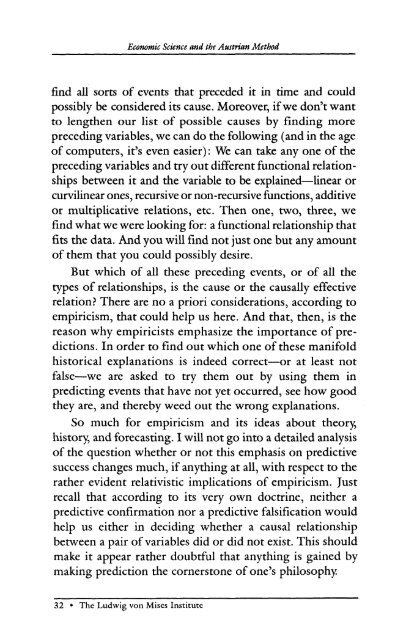Economic Science and the Austrian Method_3
Economic Science and the Austrian Method_3
Economic Science and the Austrian Method_3
- No tags were found...
You also want an ePaper? Increase the reach of your titles
YUMPU automatically turns print PDFs into web optimized ePapers that Google loves.
<strong>Economic</strong> <strong>Science</strong> <strong>and</strong> <strong>the</strong> <strong>Austrian</strong> <strong>Method</strong>find all sorts of events that preceded it in time <strong>and</strong> couldpossibly be considered its cause. Moreover, ifwe don't wantto leng<strong>the</strong>n our list of possible causes by finding morepreceding variables, we can do <strong>the</strong> following (<strong>and</strong> in <strong>the</strong> ageof computers, it's even easier): We can take anyone of <strong>the</strong>preceding variables <strong>and</strong> tryout different functional relationshipsbetween it <strong>and</strong> <strong>the</strong> variable to be explained-linear orcurvilinear ones, recursive or non-recursive functions, additiveor multiplicative relations, etc. Then one, two, three, wefind what we were looking for: a functional relationship thatfits <strong>the</strong> data. And you will find not just one but any amountof <strong>the</strong>m that you could possibly desire.But which of all <strong>the</strong>se preceding events, or of all <strong>the</strong>types of relationships, is <strong>the</strong> cause or <strong>the</strong> causally effectiverelation? There are no a priori considerations, according toempiricism, that could help us here. And that, <strong>the</strong>n, is <strong>the</strong>reason why empiricists emphasize <strong>the</strong> importance of predictions.In order to find out which one of <strong>the</strong>se manifoldhistorical explanations is indeed correct-or at least notfalse-we are asked to try <strong>the</strong>m out by using <strong>the</strong>m inpredicting events that have not yet occurred, see how good<strong>the</strong>y are, <strong>and</strong> <strong>the</strong>reby weed out <strong>the</strong> wrong explanations.So much for empiricism <strong>and</strong> its ideas about <strong>the</strong>or~histor~ <strong>and</strong> forecasting. I will not go into a detailed analysisof <strong>the</strong> question whe<strong>the</strong>r or not this emphasis on predictivesuccess changes much, if anything at all, with respect to <strong>the</strong>ra<strong>the</strong>r evident relativistic implications of empiricism. Justrecall that according to its very own doctrine, nei<strong>the</strong>r apredictive confirmation nor a predictive falsification wouldhelp us ei<strong>the</strong>r in deciding whe<strong>the</strong>r a causal relationshipbetween a pair ofvariables did or did not exist. This shouldmake it appear ra<strong>the</strong>r doubtful that anything is gained bymaking prediction <strong>the</strong> cornerstone ofone's philosoph~32 • The Ludwig von Mises Institute


